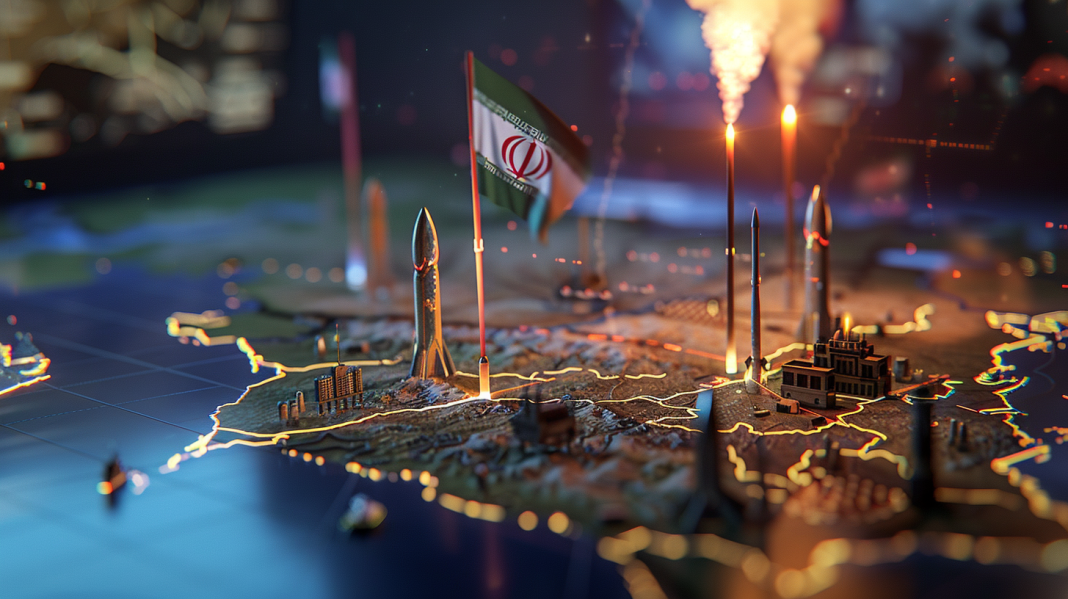Iran-Israel War: Will the United States Be Drawn Into Direct Conflict?
The Middle East teeters on a knife’s edge. Following Iran’s unprecedented direct missile and drone barrage against Israel in April 2024, and Israel’s subsequent retaliatory strikes inside Iranian territory, the long-simmering “shadow war” between Tehran and Jerusalem erupted into open confrontation. This dramatic escalation thrusts a critical question onto the global stage: Will the USA join the Iran-Israel war? The possibility carries immense weight, threatening to transform a devastating regional conflict into a global conflagration.
Understanding the intricate dynamics of American interests, alliances, military posture, and political pressures is paramount to assessing this perilous scenario. This analysis delves deep into the factors shaping Washington’s potential involvement in the volatile Iran-Israel war.
The Iran-Israel War: From Proxy Battles to Direct Fire
The April 2024 exchange marked a dangerous paradigm shift. For decades, the Iran-Israel war was fought indirectly. Iran funded, armed, and directed its “Axis of Resistance” – primarily Hezbollah in Lebanon, Hamas in Gaza, and various Shia militias in Iraq and Syria – to harass and attack Israel. Israel, in turn, conducted covert operations and airstrikes targeting Iranian personnel, nuclear scientists, and weapons shipments across the region. This tit-for-tat proxy conflict allowed both sides to pursue strategic goals without triggering a full-scale, direct war.
Iran’s Calculations: Tehran’s direct attack was framed as retaliation for an Israeli airstrike on its consulate in Damascus (widely attributed to Israel), which killed senior Islamic Revolutionary Guard Corps (IRGC) commanders. It demonstrated Iran’s willingness to escalate when its “red lines” are crossed, showcasing its growing missile and drone capabilities. However, the attack was largely thwarted by a multinational defense effort (involving the US, UK, France, Jordan, and Israel), suggesting Iran sought to save face without provoking overwhelming retaliation.
Israel’s Response: Israel’s calibrated strike on an Iranian air defense site near Isfahan signaled its capability to hit deep within Iran but also, arguably, its desire (encouraged by intense US pressure) to avoid a massive escalation cycle *at that moment*. The underlying tensions, however, remain volatile and unresolved.
This shift from proxy warfare to direct strikes fundamentally alters the risk calculus for the United States, bringing the specter of a wider Iran-Israel war much closer.
Why the USA Might Be Forced into the Iran-Israel War
American involvement is far from guaranteed, but powerful forces could pull Washington into the vortex of the Iran-Israel war:
1.The Ironclad Alliance with Israel: The US commitment to Israel’s security is deeply embedded in American foreign policy, domestic politics, and strategic doctrine. If Israel faced an existential threat – such as a massive, overwhelming Iranian attack potentially involving ballistic missiles or unconventional weapons – the political and moral pressure on the US to intervene directly would be immense. Failure to act could shatter the alliance.
2. Defense of US Forces & Interests: Thousands of US troops remain deployed across the Middle East (Iraq, Syria, Jordan, Gulf states). Iranian-backed militias have repeatedly attacked these forces since the Gaza conflict began. A significant escalation in the Iran-Israel war could see Iran directly order its proxies to intensify attacks on US personnel or bases, potentially causing mass casualties. The US would almost certainly retaliate forcefully, potentially striking Iranian targets directly.
3.Protecting Regional Stability & Oil Flows: The US has a vested interest in preventing a catastrophic regional war that could engulf the Gulf monarchies (key allies), disrupt critical global oil supplies (impacting the world economy), and empower adversaries like Russia and China. If the conflict spiraled, threatening Saudi Arabia, the UAE, or critical maritime chokepoints like the Strait of Hormuz, US intervention to restore stability could become necessary.
4. Countering Iranian Nuclear Ambitions: The unresolved Iranian nuclear program is a core US security concern. A full-scale Iran-Israel war could provide Iran with a pretext to dramatically accelerate its nuclear program or even pursue weaponization. The US might feel compelled to act militarily to prevent this, regardless of the Israel-Hamas conflict dynamics.
5. Credibility and Deterrence: After years of emphasizing deterrence against Iran, a perception that the US stood by while Iran pummeled Israel or killed US troops could severely damage American credibility globally. Washington might feel forced to demonstrate resolve through military action to maintain its deterrent posture.
The Powerful Case for US Restraint in the Iran-Israel War
Despite these pressures, compelling arguments and significant obstacles push towards US restraint:
1. Avoiding a Wider Regional Conflagration: Direct US strikes on Iranian soil would dramatically escalate the conflict, potentially drawing in Hezbollah’s vast rocket arsenal (over 150,000 missiles) against Israel, Iranian proxies targeting Gulf states, and disrupting global energy markets. The Biden administration has consistently prioritized containing the conflict.
2. War Fatigue and Domestic Politics: After decades of war in Iraq and Afghanistan, significant segments of the American public and political spectrum (across both parties) are deeply wary of new military entanglements in the Middle East, especially involving ground troops. The upcoming 2024 US presidential election further complicates any decision for major military action.
3. Focus on China and Ukraine: The US national security strategy explicitly prioritizes strategic competition with China and supporting Ukraine against Russia. A major war in the Middle East would drain critical military, diplomatic, and financial resources from these primary objectives.
4. Effectiveness of Limited Support: The US has demonstrated it can significantly bolster Israel’s defense without direct combat. The successful multinational effort to shoot down Iranian drones and missiles in April 2024 showcased this model: providing intelligence, missile defense systems (like Patriot and THAAD batteries), naval assets (like AEGIS destroyers), and diplomatic coordination. Similar support continues for Israel’s defense against Hezbollah.
5. Diplomatic Off-Ramps: The US, along with European and Arab partners, continues to push aggressively for de-escalation and diplomatic solutions. This includes intense shuttle diplomacy, pressure on Israel regarding Gaza, and efforts to manage tit-for-tat responses. Preventing a full-scale Iran-Israel war remains the top priority.

Potential Pathways for US Involvement in the Iran-Israel War
If the US does get drawn in, it would likely manifest in escalating tiers, not an immediate declaration of war:
1. Enhanced Defensive & Indirect Support (Current State):
-Massive intelligence sharing (satellites, signals intel).
-Reinforcing missile defense systems in Israel and the Gulf.
-Deploying additional US Navy assets (carrier strike groups, destroyers).
-Accelerated weapons deliveries to Israel and key Arab partners.
-Covert operations support.
2. Direct Defensive Actions:
– US forces actively intercepting Iranian drones/missiles bound for Israel or Gulf allies (as seen in April 2024).
– Cyber operations to disrupt Iranian command and control or missile launches.
3. Retaliatory Strikes Against Proxies:
– Direct US airstrikes on Iranian-backed militia positions in Iraq, Syria, or Yemen in response to attacks on US forces or allies. This is already occurring periodically but could intensify dramatically.
4. Direct Strikes on Iranian Assets Outside Iran:
– Targeting IRGC bases, missile sites, or drone facilities in Syria, Iraq, or Lebanon.
– Striking Iranian naval assets threatening shipping lanes.
5. Direct Strikes on Iranian Soil (Major Escalation):
– Precision strikes on IRGC command centers, missile launch sites, nuclear facilities, or drone factories within Iran in response to a catastrophic attack on Israel or US forces deemed to originate from Iran directly. This would cross a major threshold and risk uncontrollable escalation.
The Global Stakes: International Reactions to US Involvement
The world watches the Iran-Israel war with profound anxiety. US involvement would trigger complex international reactions:
European Allies (UK, France, Germany): Likely to provide strong political support and potentially participate in defensive actions (as in April 2024), but deeply reluctant to endorse direct strikes on Iran. Focused intensely on de-escalation.
Arab States (Saudi Arabia, UAE, Egypt, Jordan): Publicly condemn Israeli actions in Gaza and fear Iranian hegemony. Privately, they dread Iranian aggression and rely on US security guarantees. They would likely allow use of their airspace/territory for defensive operations but vehemently oppose actions seen as provoking a wider war that engulfs them. Their priority is regional stability.
Russia & China: Both would seize the opportunity to condemn US “warmongering,” exploit divisions in the West, potentially strengthen ties with Iran, and position themselves as voices for peace (despite their own actions in Ukraine and the South China Sea). They could obstruct UN Security Council actions.
Global Economy: Any significant US involvement, especially strikes inside Iran, would likely cause oil prices to spike dramatically, impacting inflation and growth worldwide. Disruptions to shipping in the Strait of Hormuz would have catastrophic global economic consequences.
International Law & Institutions: The UN would face immense strain. Debates over the legality of strikes and the right to self-defense would be fierce, potentially further weakening the international rules-based order.
The Unpredictable Future: Can the Iran-Israel War Be Contained?
Predicting the trajectory of the Iran-Israel war is fraught with peril. The current, tense standoff could persist, marked by continued indirect conflict and periodic flare-ups. However, the potential triggers for catastrophic escalation remain ever-present:
– A major miscalculation by either Iran or Israel.
– A successful, devastating attack by Iranian proxies causing mass Israeli or American casualties.
– An Israeli strike perceived by Iran as crossing a new nuclear threshold.
– Internal political pressures within Israel or Iran pushing leaders towards more aggressive action.
The Biden administration’s strategy hinges on a precarious balance: demonstrating unwavering support for Israel’s defense to deter Iran, while simultaneously restraining Israel from actions that could trigger an uncontrollable escalation, and protecting US forces. This multi-front pressure test is relentless.
Conclusion: A Deliberate Path Away from the Abyss
The question “Will the USA join the Iran-Israel war?” lacks a simple yes or no answer. Direct, large-scale US military intervention on Iranian soil remains the least likely scenario in the immediate term, viewed by Washington as a last resort with potentially catastrophic consequences. The current US posture is defined by robust defensive support for Israel and regional allies, combined with aggressive diplomacy aimed at de-escalation and preventing a wider war.
However, the risks are undeniable and escalating. The transition from proxy conflict to direct strikes between Iran and Israel has fundamentally heightened the danger. A major attack on US forces by Iranian proxies, an existential threat to Israel emanating directly from Iran, or a catastrophic regional destabilization could force Washington’s hand. The Iran-Israel war is the most volatile flashpoint in global geopolitics today. The path forward demands extraordinary diplomatic skill, calibrated deterrence, and a shared recognition by all actors – especially Iran, Israel, and the United States – that the cost of a full-blown regional war would be incalculable. The world holds its breath, hoping restraint prevails over the drums of war.
